Politics
August ‘third-hottest month globally’ on record
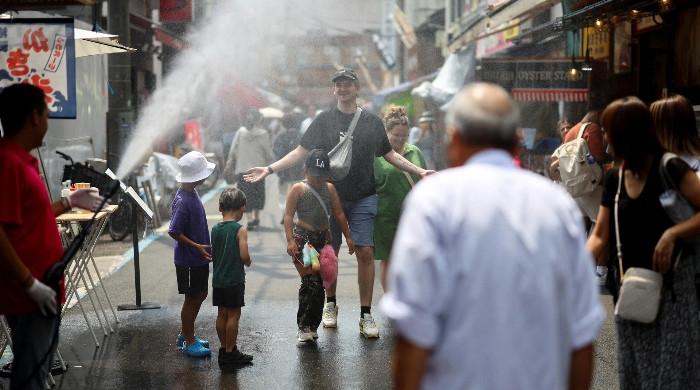
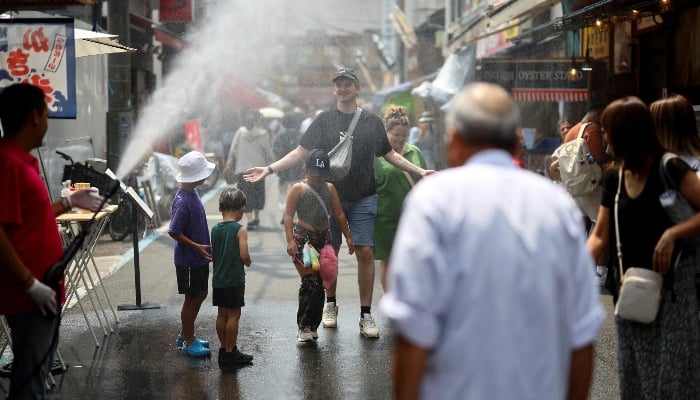
PARIS: Devastating wildfires and blistering heatwaves during the world’s third-hottest August on record underscored the urgency of tackling climate change and preparing for its deadly consequences, the European global warming monitor said Tuesday.
Southwest Europe wilted through a third summer heatwave, fires tore through Spain and Portugal, while many parts of Asia experienced above-average temperatures during a scorching month that neared record highs.
The world’s oceans, which help regulate Earth’s climate by absorbing excess heat from the atmosphere, were also close to record high temperatures for the month. Hotter seas are linked to worsening weather extremes.
“With the world’s (oceans) also remaining unusually warm, these events underline not only the urgency of reducing emissions but also the critical need to adapt to more frequent and intense climate extremes,” said Samantha Burgess, strategic lead for climate at the EU’s Copernicus Climate Change Service.
Global temperatures have been stoked ever higher by humanity’s emissions of planet-heating gases, largely from fossil fuels burned on a massive scale since the industrial revolution.
Copernicus takes these measurements using billions of satellite and weather readings, both on land and at sea, and their data extends back to 1940.
The average temperature globally for August was 1.29 degrees Celsius above pre-industrial times, marginally cooler than the monthly record set in 2023 and tied with 2024.
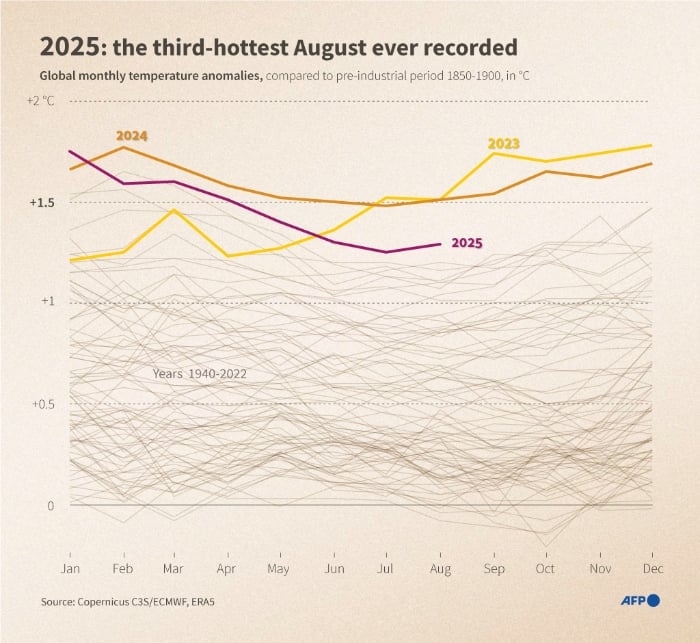
Such incremental rises may appear small, but scientists warn that is already destabilising the climate and making storms, floods and other disasters fiercer and more frequent.
In its monthly bulletin, Copernicus said that western Europe experienced the continent’s most pronounced above-average temperatures, with southwest France and the Iberian Peninsula particularly affected.
Spain suffered a 16-day heatwave that caused more than 1,100 deaths, according to the Carlos III Health Institute. Wildfires in Spain and Portugal forced thousands to evacuate.
Last week, scientists said human-caused climate change made the hot, dry and windy conditions that fanned the blazes 40 times more likely.
Outside Europe, temperatures were most above average across Siberia, parts of Antarctica, China, the Korean Peninsula, Japan and the Middle East.
Record-breaking ocean temperatures were measured in the North Atlantic to the west of France and the United Kingdom in August. Across the Mediterranean, the picture was mixed and less extreme than 2024.
The UK, Japan and South Korea sweltered this year through the hottest summers since each country began keeping records, their respective weather agencies announced earlier this month.
Politics
Iran president tells govt listen to protesters ‘legitimate demands’
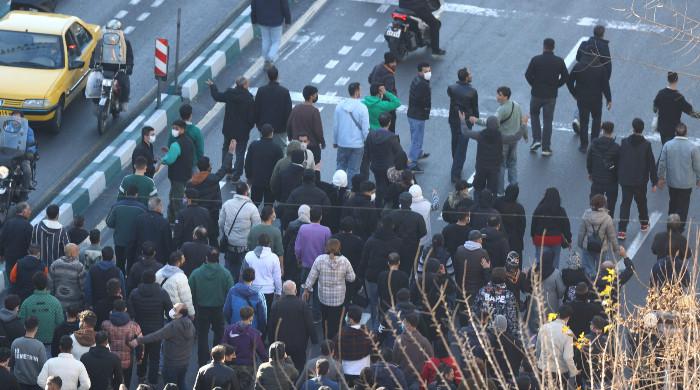
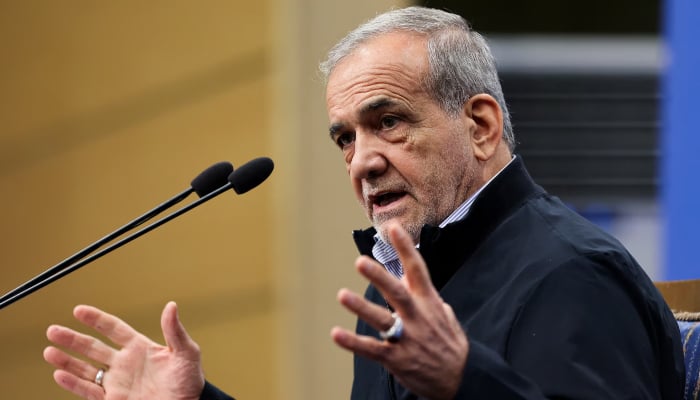
- Tehran shopkeepers keep stores shut amid currency plunge.
- Protesters demand intervention on exchange-rate volatility.
- Central bank governor replaced as crisis deepens.
TEHRAN: Iran’s president urged his government to listen to the “legitimate demands” of protesters, state media reported on Tuesday, after several days of demonstrations by shopkeepers in Tehran over economic hardships.
Shopkeepers in the capital had shut their stores for the second day in a row on Monday, after Iran’s embattled currency hit new lows on the unofficial market.
The US dollar was trading at around 1.42 million rials on Sunday — compared to 820,000 rials a year ago — and the euro nearing 1.7 million rials, according to price monitoring websites.
“I have asked the interior minister to listen to the legitimate demands of the protesters by engaging in dialogue with their representatives so that the government can do everything in its power to resolve the problems and act responsibly,” President Masoud Pezeshkian said, according to the state-run IRNA news agency.
Protesters “are demanding immediate government intervention to rein in exchange-rate fluctuations and set out a clear economic strategy”, the pro-labour news agency ILNA reported Monday.
Price fluctuations are paralysing the sales of some imported goods, with both sellers and buyers preferring to postpone transactions until the outlook becomes clearer, AFP correspondents noted.
“Continuing to do business under these conditions has become impossible,” ILNA quoted protesters as saying.
The conservative-aligned Fars news agency released images showing a crowd of demonstrators occupying a major thoroughfare in central Tehran, known for its many shops.
Another photograph appeared to show tear gas being used to disperse protesters.
“Minor physical clashes were reported… between some protesters and the security forces,” Fars said, warning that such gatherings could lead to instability.
Battered economy
Iranian Chief Justice Gholamhossein Mohseni Ejei called for “the swift punishment of those responsible for currency fluctuations”, the justice ministry’s Mizan agency reported Monday.
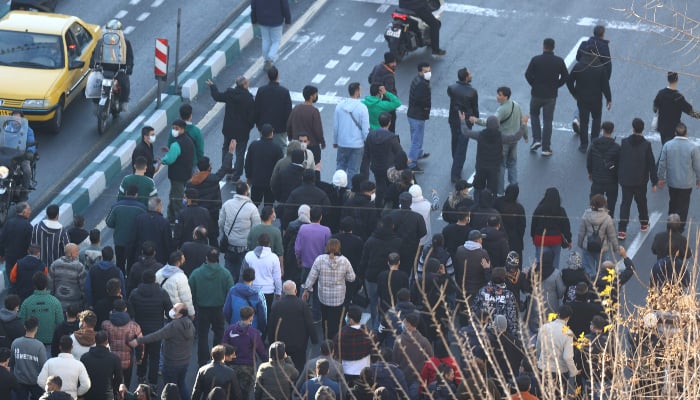
The government has also announced the replacement of the central bank governor.
“By decision of the president, Abdolnasser Hemmati will be appointed governor of the Central Bank,” presidency communications official Mehdi Tabatabaei posted on X.
Hemmati is a former economy and finance minister who was dismissed by parliament in March because of the sharp depreciation of the rial.
Pezeshkian delivered on Sunday the budget for the next Persian year to parliament, vowing to fight inflation and the high cost of living.
In December, inflation stood at 52% year-on-year, according to official statistics. But this figure still falls far short of many price increases, especially for basic necessities.
The country’s economy, already battered by decades of Western sanctions, was further strained after the United Nations in late September reinstated international sanctions linked to the country’s nuclear programme that were lifted 10 years ago.
Western powers and Israel accuse Iran of seeking to acquire nuclear weapons, a charge Tehran denies.
Politics
World’s largest accounting body to scrap online exams as AI fuels cheating fears


The world’s largest accounting body is pulling back from online examinations, citing growing concerns that advances in artificial intelligence have made remote assessments too easy to exploit, The Guardian reported.
The Association of Chartered Certified Accountants (ACCA) said students will largely be required to sit exams in person from March, bringing to an end a practice introduced during the Covid pandemic. Remote exams will only be permitted in limited and exceptional cases.
The decision follows what the ACCA describes as an escalating challenge in maintaining exam integrity. According to its chief executive, Helen Brand, the methods used to cheat have become increasingly sophisticated, overtaking the effectiveness of existing monitoring systems.
Online testing was originally adopted to ensure continuity during lockdowns, allowing students to progress towards qualification when exam centres were closed. Since then, however, regulators and professional bodies have raised repeated warnings about misconduct in high-stakes professional exams.
In 2022, the Financial Reporting Council, the UK’s audit and accounting watchdog, described cheating as an active concern across major firms, including top-tier auditors such as the Big Four. That year also saw EY fined $100m (£74m) by US regulators after employees were found to have cheated on ethics exams and the firm was accused of misleading investigators.
The ACCA, which has nearly 260,000 members globally, said it has invested significant effort in tackling dishonest behaviour but acknowledged that those intent on cheating are adapting rapidly, driven in part by easy access to AI tools.
Other professional bodies have reported similar pressures. The Institute of Chartered Accountants in England and Wales said last year that reports of cheating continued to rise, although it still allows some exams to be taken online.
Brand said the wider trend across professional qualifications is clear, with fewer high-stakes exams relying on remote invigilation as concerns about credibility and trust grow.
Politics
Bangladesh’s first female prime minister, Khaleda Zia, dies
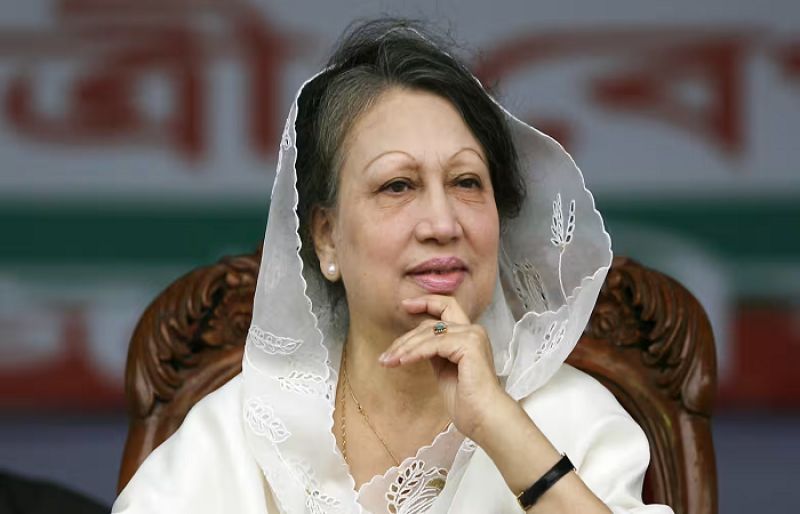

Her opposition Bangladesh Nationalist Party (BNP) said that she died after a prolonged illness. She had advanced cirrhosis of the liver, arthritis, diabetes, and chest and heart problems, her doctors said.
She went to London for medical treatment in early 2025, staying for four months before returning home.
Though Khaleda had been out of power since 2006 and had spent several years in jail or under house arrest, she and her centre-right BNP continued to command much support.
The BNP is seen as the frontrunner to win the parliamentary election slated to take place in February.
Her son and acting chairman of the party, Tarique Rahman, 60, returned to the country last week from nearly 17 years in self-exile and is widely seen as a strong candidate to become prime minister.
Since August 2024, after a student-led uprising led to the ouster of Hasina, Bangladesh has been run by an interim government headed by Muhammad Yunus, the Nobel peace laureate and microfinance pioneer.
In November, Hasina was sentenced to death in absentia for her deadly crackdown on the student protests.
Known by her first name, Khaleda was described as shy and devoted to raising her two sons until her husband, military leader and then-President Ziaur Rahman, was assassinated in an attempted army coup in 1981.
Three years later, she became the head of the BNP, which her husband had founded, and vowed to deliver on his aim of “liberating Bangladesh from poverty and economic backwardness”.
She joined hands with Hasina, daughter of Bangladesh’s founding father and head of the Awami League party, to lead a popular uprising for democracy that toppled military ruler Hossain Mohammad Ershad in 1990.
Battling begums
But their cooperation did not last long. Their bitter rivalry would lead to the two being dubbed “the battling Begums” — a phrase that uses an Urdu honorific for prominent women.
Supporters saw her as polite and traditional yet quietly stylish, someone who chose her words carefully.
But they also viewed her as a bold, uncompromising leader when it came to defending her party and confronting her rivals.
Hasina, by contrast, was far more outspoken and assertive. Their opposite personalities helped fuel the rivalry that dominated Bangladesh’s politics for decades.
In 1991, Bangladesh held what was hailed as its first free election. Khaleda won a surprise victory over Hasina, having gained the support of Jamaat-e-Islami.
In doing so, Khaleda became Bangladesh’s first female prime minister and only the second woman to lead a democratic government of a mainly Muslim nation after Benazir Bhutto, elected to lead Pakistan three years earlier.
Khaleda replaced the presidential system with a parliamentary one, so that power rested with the prime minister. She also lifted restrictions on foreign investment and made primary education compulsory and free.
She lost to Hasina in the 1996 general election but came back five years later with a surprise landslide win.
Her second term was marred by the rise of militants and allegations of corruption.
In 2004, a rally that Hasina was addressing was hit by grenades. Hasina survived but over 20 people were killed and more than 500 wounded. Khaleda’s government and its allies were widely blamed.
In 2018, after Hasina had reclaimed Bangladesh’s highest office, Rahman was tried in absentia and sentenced to life for the attack. The BNP denounced the trial as politically motivated.
Detention and freedom
Although Khaleda later clamped down on radical groups, her second stint as prime minister ended in 2006 when an army-backed interim government took power amid political instability and street violence.
The interim government jailed both Khaleda and Hasina on charges of corruption and abuse of power for about a year before they were both released ahead of a general election in 2008.
Khaleda never regained power. With the BNP boycotting the 2014 and 2024 elections, her vitriolic feud with Hasina continued to dominate Bangladeshi politics.
Tension between their two parties often led to strikes, violence and deaths, impeding the economic development of Bangladesh, a poverty-stricken country of about 175 million that is low-lying and prone to devastating floods.
In 2018, Khaleda, Rahman and aides were convicted of stealing some $250,000 in foreign donations received by an orphanage trust set up when she was last prime minister — charges that she said were part of a plot to keep her and her family out of politics.
She was jailed but moved to house arrest in March 2020 on humanitarian grounds as her health deteriorated.
Khaleda was freed from house arrest in August 2024 after Hasina’s ouster.
In early 2025, Khaleda and Rahman were acquitted by Bangladesh’s Supreme Court in the corruption case that resulted in the 2018 jail sentences. Rahman had been acquitted of the 2004 grenade attack on Hasina a month earlier.
Condolences
Prime Minister Shehbaz Sharif and Deputy Prime Minister Ishaq Dar have expressed deep sorrow over the passing of Begum Khaleda Zia, paying tribute to her political legacy.
In a message shared on X, the prime minister said he was deeply saddened by Khaleda Zia’s death, describing her as a leader whose lifelong service to Bangladesh and contributions to the country’s growth and development would be remembered as a lasting legacy.
“Begum Zia was a committed friend of Pakistan. My Government and the people of Pakistan stand with the people of Bangladesh in this moment of sorrow.
Our thoughts and prayers are with her family, friends and the people of Bangladesh during this difficult time. May Allah SWT bless her soul. Ameen!” said PM Shehbaz.
DPM Dar said: “Heartfelt condolences on the sad demise of Begum Khaleda Zia, former Prime Minister of Bangladesh and Chairperson, Bangladesh Nationalist Party (BNP).”
-

 Sports3 days ago
Sports3 days agoBrooks Koepka should face penalty if he rejoins PGA Tour, golf pundit says
-

 Sports1 week ago
Sports1 week agoPatriots vs. Ravens (Dec 21, 2025) Live Score – ESPN
-

 Sports1 week ago
Sports1 week agoWATCH: Pakistan’s winning moment as Green Shirts clinch U19 Asia Cup title
-

 Business4 days ago
Business4 days agoGovt registers 144olive startups | The Express Tribune
-

 Entertainment1 week ago
Entertainment1 week agoPentatonix sings “Christmas Time Is Here”
-

 Business1 week ago
Business1 week agoNeptune Logitek Shares List At 26% Discount, IPO Investors Suffer Nearly Rs 30,000 Losses
-

 Politics1 week ago
Politics1 week agoMoscow car blast kills Russian general hours after US talks
-

 Entertainment1 week ago
Entertainment1 week agoTimothée Chalamet in question for ‘Marty Supreme’ press tour attitude






